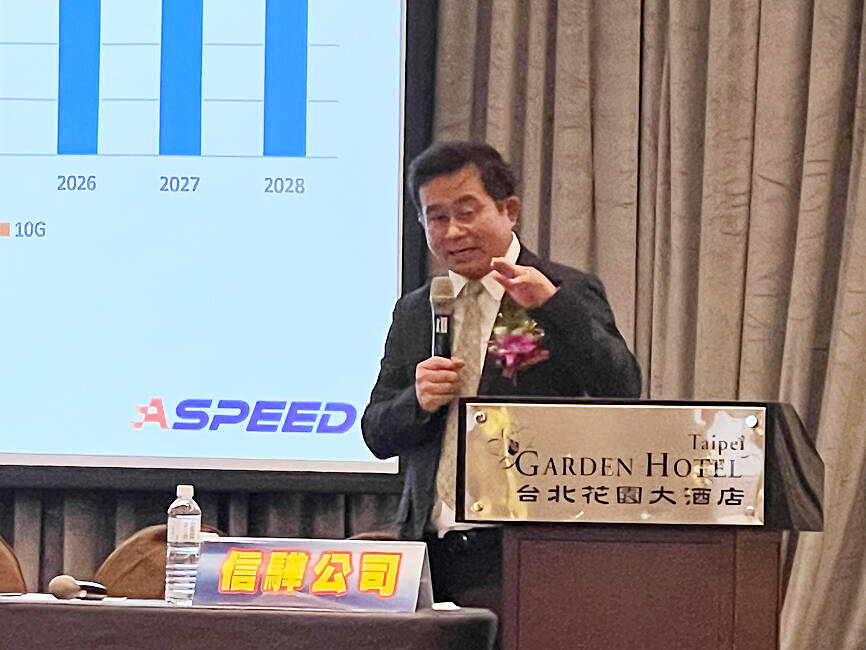Aspeed Technology Inc (信驊) expects significant revenue growth this year following a 40 percent drop last year, the world’s biggest supplier of baseboard management controllers (BMC) for servers said yesterday.
Recovering demand for general-purpose servers and rising demand for artificial intelligence (AI) servers based on Nvidia Corp’s new Blackwell chips would be the major growth drivers, Aspeed said.
“We have been seeing a comeback in [BMC] orders for general-purpose servers over the past two to three weeks,” Aspeed chairman Chris Lin (林鴻明) told an investors’ conference in Taipei.

Photo: Lisa Wang, Taipei Times
Revenue growth would be driven mainly by the increase in BMCs per server rack, Lin said.
However, it would be a great challenge to see revenue rebound to the peak level in 2022, when customers built inventories for fear of supply disruptions, he said.
Aspeed’s revenue last year fell to NT$3.13 billion (US$98.1 million) from NT$5.21 billion in 2022 due to supply chain inventory adjustments, the company said.
New AI servers equipped with GB200 chips would be a boon to Aspeed’s sales, as the number of BMCs used would be almost double that of older-generation H100 chips, Lin said.
Nvidia’s GB200 chips for AI servers are expected to hit the market in the fourth quarter, he said.
Aspeed yesterday raised its revenue forecast for this quarter to between NT$967 million and NT$1.03 billion, compared with NT$984 million last quarter, buoyed by demand for general-purpose servers, Lin said.
Revenue next quarter is projected to grow by a single-digit percentage to between NT$1.06 billion and US$1.13 billion, he said.
The company is to benefit from hyperscalers’ increased investment in data centers and servers, as major global data center operators’ capital spending is expected to rise 25 percent to US$198 billion this year, Aspeed said, citing projections by Bloomberg and Morgan Stanley.
Their spending on AI servers is forecast to soar about 92 percent to US$77 billion from US$40 billion last year, it said.
Gross margin this year would be little changed, ranging from 63 percent to 65 percent, compared with 64.14 percent last year, the company said.
Aspeed reported that net profit last year plunged about 52 percent to NT$1 billion from a year earlier. Earnings per share more than halved to NT$26.66 from NT$55.72.
The board of directors approved the distribution of a cash dividend of NT$20 per share, implying a payout ratio of about 75 percent.

When an apartment comes up for rent in Germany’s big cities, hundreds of prospective tenants often queue down the street to view it, but the acute shortage of affordable housing is getting scant attention ahead of today’s snap general election. “Housing is one of the main problems for people, but nobody talks about it, nobody takes it seriously,” said Andreas Ibel, president of Build Europe, an association representing housing developers. Migration and the sluggish economy top the list of voters’ concerns, but analysts say housing policy fails to break through as returns on investment take time to register, making the

‘SILVER LINING’: Although the news caused TSMC to fall on the local market, an analyst said that as tariffs are not set to go into effect until April, there is still time for negotiations US President Donald Trump on Tuesday said that he would likely impose tariffs on semiconductor, automobile and pharmaceutical imports of about 25 percent, with an announcement coming as soon as April 2 in a move that would represent a dramatic widening of the US leader’s trade war. “I probably will tell you that on April 2, but it’ll be in the neighborhood of 25 percent,” Trump told reporters at his Mar-a-Lago club when asked about his plan for auto tariffs. Asked about similar levies on pharmaceutical drugs and semiconductors, the president said that “it’ll be 25 percent and higher, and it’ll

CHIP BOOM: Revenue for the semiconductor industry is set to reach US$1 trillion by 2032, opening up opportunities for the chip pacakging and testing company, it said ASE Technology Holding Co (日月光投控), the world’s largest provider of outsourced semiconductor assembly and test (OSAT) services, yesterday launched a new advanced manufacturing facility in Penang, Malaysia, aiming to meet growing demand for emerging technologies such as generative artificial intelligence (AI) applications. The US$300 million facility is a critical step in expanding ASE’s global footprint, offering an alternative for customers from the US, Europe, Japan, South Korea and China to assemble and test chips outside of Taiwan amid efforts to diversify supply chains. The plant, the company’s fifth in Malaysia, is part of a strategic expansion plan that would more than triple

Taiwanese artificial intelligence (AI) server makers are expected to make major investments in Texas in May after US President Donald Trump’s first 100 days in office and amid his rising tariff threats, Taiwan Electrical and Electronic Manufacturers’ Association (TEEMA, 台灣電子電機公會) chairman Richard Lee (李詩欽) said yesterday. The association led a delegation of seven AI server manufacturers to Washington, as well as the US states of California, Texas and New Mexico, to discuss land and tax issues, as Taiwanese firms speed up their production plans in the US with many of them seeing Texas as their top option for investment, Lee said. The